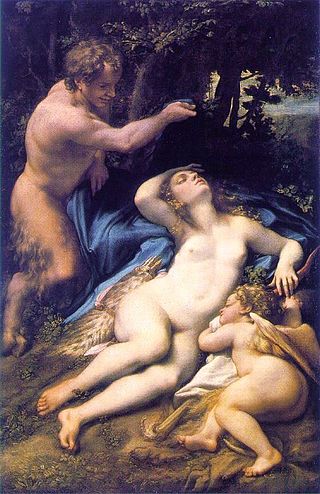Related Research Articles
In Greek mythology, the name Laodamia referred to:
In Greek mythology, Laothoe can refer to the following women:
In Greek mythology, Philammon was an excellent musician, a talent he received from his father Apollo.
In Greek mythology, Licymnius was a good friend of Heracles and an illegitimate son of Electryon, King of Tiryns and Mycenae in the Argolid. His mother is given as Mideia, a Phrygian woman. One source mentions Alco (Ἀλκώ) as his sister. Licymnios appears in the Iliad as an old uncle of Heracles
In Greek mythology and history, Promachus is a name that refers to several different people.
There are several figures named Pelagon in Greek mythology.
Clytius, also spelled Klythios, Klytios, Clytios, and Klytius, is the name of multiple people in Greek mythology:
In Greek mythology, Eurypyle may refer to the following personages:
Nicippe, also Nikippe is a name attributed to several women in Greek mythology.
Lysippe is the name of several different women in Greek mythology:
Alector refers to more than one person in classical mythology and history:
In Greek mythology, Eioneus is a name attributed to the following individuals:
The name Merops refers to several figures from Greek mythology:
Lysidice or Lysidike is the name of several women in Greek mythology.
Thebe is a feminine name mentioned several times in Greek mythology, in accounts that imply multiple female characters, four of whom are said to have had three cities named Thebes after them:
In Greek mythology, Argiope may refer to:

In Greek mythology, Antiope or Antiopa may refer to the following
In Greek mythology, Chryseis may refer to the following women:
In Greek mythology, Ilus was the founder of the city called Ilios or Ilion to which he gave his name. When the latter became the chief city of the Trojan people it was also often called Troy, the name by which it is best known today. In some accounts, Ilus was described to have a plume of horsehair.
In Greek mythology, Isander or Isandrus or Peisander, was a Lycian prince and the son of King Bellerophon.
References
- Conon , Fifty Narrations, surviving as one-paragraph summaries in the Bibliotheca (Library) of Photius, Patriarch of Constantinople translated from the Greek by Brady Kiesling. Online version at the Topos Text Project.
- Diodorus Siculus, The Library of History translated by Charles Henry Oldfather. Twelve volumes. Loeb Classical Library. Cambridge, Massachusetts: Harvard University Press; London: William Heinemann, Ltd. 1989. Vol. 3. Books 4.59–8. Online version at Bill Thayer's Web Site
- Diodorus Siculus, Bibliotheca Historica. Vol 1-2. Immanel Bekker. Ludwig Dindorf. Friedrich Vogel. in aedibus B. G. Teubneri. Leipzig. 1888–1890. Greek text available at the Perseus Digital Library.
- Homer, The Iliad with an English Translation by A.T. Murray, Ph.D. in two volumes. Cambridge, MA., Harvard University Press; London, William Heinemann, Ltd. 1924. ISBN 978-0674995796. Online version at the Perseus Digital Library.
- Homer, Homeri Opera in five volumes. Oxford, Oxford University Press. 1920. ISBN 978-0198145318. Greek text available at the Perseus Digital Library.
- John Tzetzes, Book of Histories, Book I translated by Ana Untila from the original Greek of T. Kiessling's edition of 1826. Online version at theoi.com
- Pausanias, Description of Greece with an English Translation by W.H.S. Jones, Litt.D., and H.A. Ormerod, M.A., in 4 Volumes. Cambridge, MA, Harvard University Press; London, William Heinemann Ltd. 1918. ISBN 0-674-99328-4. Online version at the Perseus Digital Library
- Pausanias, Graeciae Descriptio.3 vols. Leipzig, Teubner. 1903. Greek text available at the Perseus Digital Library.
- Pliny the Elder, The Natural History. John Bostock, M.D., F.R.S. H.T. Riley, Esq., B.A. London. Taylor and Francis, Red Lion Court, Fleet Street. 1855. Online version at the Perseus Digital Library.
- Pliny the Elder, Naturalis Historia. Karl Friedrich Theodor Mayhoff. Lipsiae. Teubner. 1906. Latin text available at the Perseus Digital Library.
- Pseudo-Apollodorus, The Library with an English Translation by Sir James George Frazer, F.B.A., F.R.S. in 2 Volumes, Cambridge, MA, Harvard University Press; London, William Heinemann Ltd. 1921. ISBN 0-674-99135-4. Online version at the Perseus Digital Library. Greek text available from the same website.